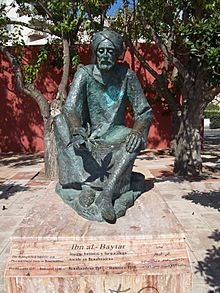Ibn al-Baytar facts for kids
Quick facts for kids
Ibn al-Bayṭār
|
|
|---|---|

Statue of Ibn al-Bayṭār in Benalmádena Costa, Spain
|
|
| Born | 1197 |
| Died | 1248 (aged 51) |
| Known for | Scientific classification Oncology |
| Scientific career | |
| Fields | Botanist, Scientist, Pharmacist, Physician |
| Influences | al-Ghāfiqī, Maimonides |
| Influenced | Ibn Abī Uṣaybiʿa, Amir Dowlat, Andrea Alpago |
Diyāʾ al-Dīn Abū Muḥammad ʿAbd Allāh ibn Aḥmad al-Mālaqī, known as Ibn al-Bayṭār, was a famous Arab scientist. He was born in 1197 in Al-Andalus (which is now Spain) and died in 1248. He was a doctor, a plant expert (botanist), and a pharmacist. His most important work was recording new medicines found by Islamic doctors in the Middle Ages. He added between 300 and 400 new types of medicine to the thousand already known. He was a student of Abu al-Abbas al-Nabati.
Contents
The Life of Ibn al-Bayṭār
Ibn al-Bayṭār was born in the city of Málaga in al-Andalus (Muslim Spain). This was at the end of the 1100s. His name "al-Mālaqī" means "from Málaga." His family name, "Ibn al-Bayṭār," means "son of the veterinarian." This was his father's job.
Ibn al-Bayṭār learned about plants from a botanist named Abu al-Abbas al-Nabati. They started collecting plants together around Spain. Al-Nabātī taught him a new way to study plants. This method used careful tests and observations. It helped them find out which reports about plants were true and which were not. Ibn al-Bayṭār used this same scientific approach in his own work.
In 1219, Ibn al-Bayṭār left Málaga to travel and collect plants. He went to many places, including North Africa and as far as Turkey. Some of the major cities he visited were Marrakech, Bugia, Constantinople, Tunis, and Tripoli.
After 1224, he began working for the Sultan al-Kāmil. The Sultan made him his chief herbalist, which meant he was the main plant expert. In 1227, the Sultan took control of Damascus. Ibn al-Bayṭār went with him, which gave him a chance to collect plants in Syria. He also explored areas like Arabia and Palestine for plants. He passed away in Damascus in 1248.
Ibn al-Bayṭār also wrote about a substance he called "snow of China." This was a way to describe saltpetre, which is a key ingredient in gunpowder.
Ibn al-Bayṭār's Important Books
Ibn al-Bayṭār wrote several important books. His most famous works focused on plants and medicines.
Compendium on Simple Medicaments and Foods
Ibn al-Bayṭār's biggest and most popular book is called Compendium on Simple Medicaments and Foods. This book is like a huge encyclopedia of medicines. It lists 1400 different plants, foods, and drugs. It also explains how to use them.
The book is organized like a dictionary, with items listed in alphabetical order. Most of the items are plants or parts of plants. For each item, Ibn al-Bayṭār added his own short notes. He also included parts from earlier writers. Most of the information comes from these older sources.
His book mentions 150 previous Arab writers and 20 Greek writers. One writer he often quoted was Dioscorides, who wrote a book called Materia Medica. Ibn al-Bayṭār also used information from Book Two of the Canon of Medicine by Ibn Sīnā. While these older books were similar, Ibn al-Bayṭār's book had much more detail. He also included many plants that were not in the older books.
This book is very long, over 900 pages in modern print. It was translated into German and French in the 1800s.
Ibn al-Bayṭār also gave detailed information about how to make Rosewater and Orangewater. He explained that scented syrups were often made from flowers and rare leaves. This was done by using hot oils and fats. These mixtures were then cooled in oils like cinnamon oil. The oils used were also made from sesame and olives. He described how Essential oils were made by heating plants and collecting the scented steam. These scented drops were used as perfume and in expensive medicines.
The Sufficient Book of Simple Drugs
Ibn al-Bayṭār's second major book is called Kitāb al-Mughnī fī al-Adwiya al-Mufrada, or The Sufficient Book of Simple Drugs. This book is another encyclopedia about Islamic medicine. It shares his knowledge of plants used to treat many different illnesses. These included problems with the head, ears, and eyes.
See also
 In Spanish: Ibn al-Baitar para niños
In Spanish: Ibn al-Baitar para niños

